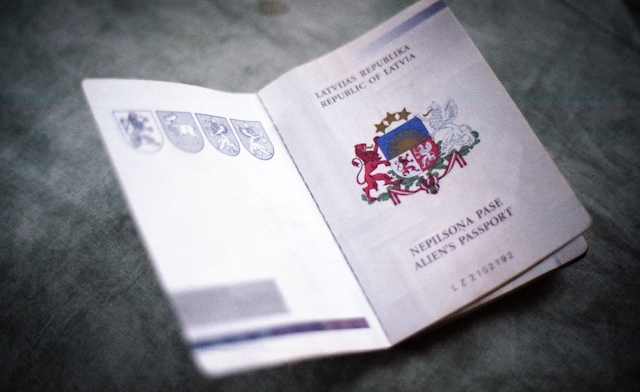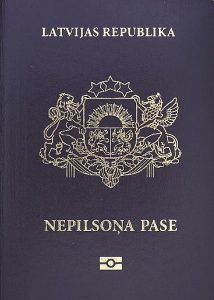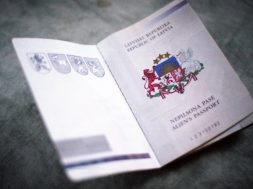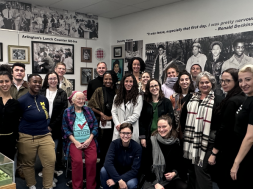
Latvia is a quite colorful and interesting country, it has a unique appearance and a rich culture. Latvia became independent in 1991 after long-term Soviet Union rule. Following the centuries of Swedish, Polish and Russian rule, the territory of Latvia was occupied by Nazi Germany during World War II which resulted in the loss of tens of thousands of lives. This was followed by the re-invasion of the Soviets. Throughout history, this country has always been one of the interest areas of the great powers and this interest still ongoing.
The people of Latvia speak Latvian and Russian. Russian is still strong among the old population. This country is home to almost 260.000 stateless[1] people. These people have no passport[2] or national-ID card. They are living in one of the member states of the EU[3] and can easily travel through to Russia (of course Schengen area too) without a visa.
Statelessness
 In international law, a stateless person is someone who is “not considered as a national by any state under the operation of its law”[4]. According to the United Nations High Commissioner for Refugees, Flippo Grandi, there are about 12 million stateless people in the world[5]. So, who are those ” stateless[6] ” people in Latvia? When Latvia became a sovereign state in 1991, only those who could track their family’s heritage in the territory to before Soviet occupation in 1940 were granted citizenship. The others – more than 730.000 people, almost a third of the population – were described as non-citizens. These people were citizens of the Soviet Union, after the independence, this group of people became ‘aliens’ of Latvia.
In international law, a stateless person is someone who is “not considered as a national by any state under the operation of its law”[4]. According to the United Nations High Commissioner for Refugees, Flippo Grandi, there are about 12 million stateless people in the world[5]. So, who are those ” stateless[6] ” people in Latvia? When Latvia became a sovereign state in 1991, only those who could track their family’s heritage in the territory to before Soviet occupation in 1940 were granted citizenship. The others – more than 730.000 people, almost a third of the population – were described as non-citizens. These people were citizens of the Soviet Union, after the independence, this group of people became ‘aliens’ of Latvia.
Even though legal terminology describes these people as ‘alien’, they are not aliens. Stateless people of Latvia are an integral part of society. They look like a Latvian, speaking like a Latvian (many Latvian speak Russian too), living like a Latvian and behaving like a Latvian. They have an unlimited right of residence and working permit in the country. However, they cannot vote even for municipality elections. Imagine, you are living in one country for decades and you don’t have a national ID, passport and voting rights.
Story of Stateless People of Latvia
During the independence referendum on 3 March 1991, The Popular Front of Latvia supported the idea of ‘Latvian citizenship for everyone who is a permanent resident of Latvia’. This approach encouraged many ethnic Russians to vote for independence. Nevertheless, after the independence Latvia did not give citizenship to its all permanent residents then they became stateless. Now, approximately 12% of the Latvian population remains stateless.
According to MFA of Latvia, the only significant difference between Latvian citizens and non-citizens is the right to vote and to work in the civil service or occupy posts directly related to national security. Moreover, the Latvian state encourages non-citizens to apply for citizenship. However, to learn a new language (Latvian) and then take a test for proficiency would not easy for aged over 60 years, senior residents. For many of them learning a new language often feels like an impracticable task. Needless to say, the majority of Latvians do not see Russian-speaking non-Latvian people as strangers; they do not even distinguish them.
Russian Speakers
Furthermore, the Russian language is still strong in many towns and cities across the country. For instance, when you visit Riga Central Market (Rīgas Centrāltirgus) you can easily observe that Russian is a major language in that place. Some state schools also provide Russian lessons for pupils; simultaneously they have to learn the Latvian language too. After the annexation of Crimea, the Latvian identity has strengthened, according to one Latvian researcher.
The case of Crimea spread out fear but also consolidated the community. Political debates on Crimea are still ongoing; the Russian’s increasing influence in the wider region brought many questions into the table. We will talk more about Baltic and Baltic states in the near future.
Endnotes:
[1] Latvia denies that its almost 260,000 non-citizens are stateless. Special temporary status was established for former USSR citizens: the status of “former citizens of the USSR without the citizenship of the Republic of Latvia or any other country” (hereinafter “non-citizens”). MFA of Latvia (link)
[2] They do not have Latvian passport, they are holding alien passport.
[3] Latvia joined the European Union on 1 May 2004.
[4] The 1954 Convention relating to the Status of Stateless Persons: Implementation within the European Union Member States and Recommendations for Harmonisation – UNHCR (link)
[6] To describe these ‘stateless’ people, ‘non-citizens’ term also used.










